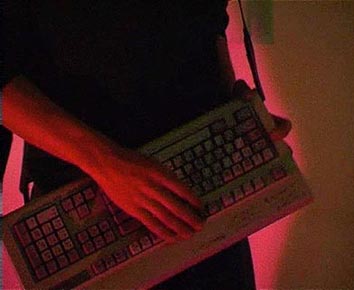Wired News has just stumbled onto 8-bit music a la vintage computers and Game Boys. Christopher Null compiles a terrific set of links in there, including Alexei Shulgin, who covers rock standards on a 386DX. (Via the always-excellent LSDJ mailing list, for users of that Game Boy cartridge — though Nanoloop lovers show up, too.)
Mr. Null then makes calls to academic “experts” — and the sparks start flying. Nicholas Collins from The School of the Art Institute of Chicago (improperly credited in Wired as the museum, not the school) says dismissively, “To imitate the wave forms of these older computers would take like 20 minutes of work.” He suggests a new Mac would cost about the same as a new machine — and there, I have to agree, though I wonder why he was asked about 386DX and not the Game Boy musicians. Got a new Mac or PC that fits in your pocket and costs $20? Didn’t think so.
Then there’s René T.A. Lysloff, professor of music at the University of California at Riverside and co-editor of the book Music and Technoculture. First he says MIDI is “nothing special.” Fine. I’m sure he’s transmitting OSC messages from his brain or something — most of us use MIDI every day but don’t have to love it. He goes on to say “the relative low-tech angle … wears thin very quickly. It just all sounds rather flaccid.” He adds, “It certainly isn’t techno. I might even add that it isn’t even very good.” That brings us to the question, what, exactly, is “it”? All 8-bit music?
Now, I’m certainly not saying all 8-bit music is great — it’s not. (Neither is “all accordion music” or “all Eagles covers played on bagpipes.”) But if you want to hear some of the best players, be sure to hear the International Chiptune Resistance Friday if you’re in NYC . . . or Google some of those artists. You’ll find something you like. Unless you’re Professor Lysloff.
Updated: A reader thinks that Prof. Lysloff’s quote sounds out of character; see comments. That may be — it’s not clear from the article what context either of these comments are. General opinion on the LSDJ list is that it’s just a lousy article. So come on, fellow academics, think we can shatter our image as being sour about new music? (And maybe get ourselves better quotes in Wired?) -PK
